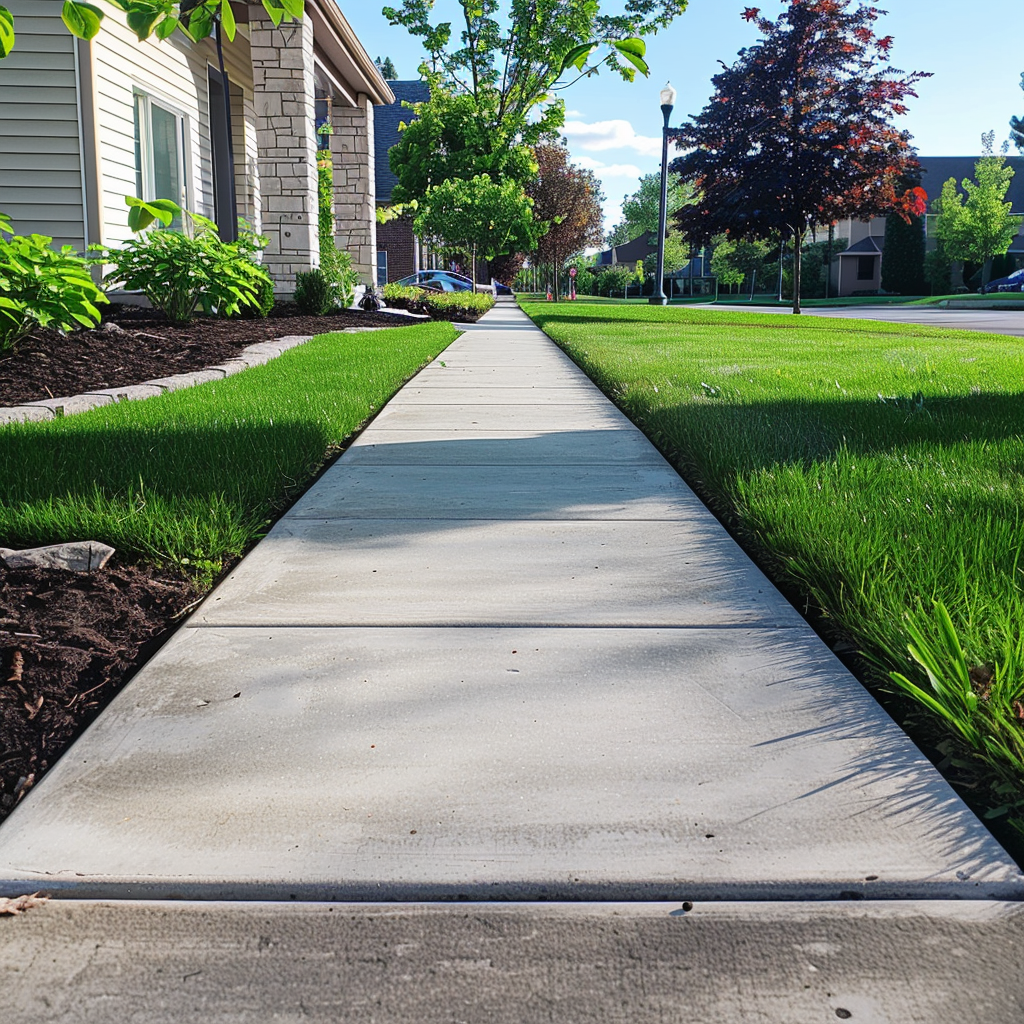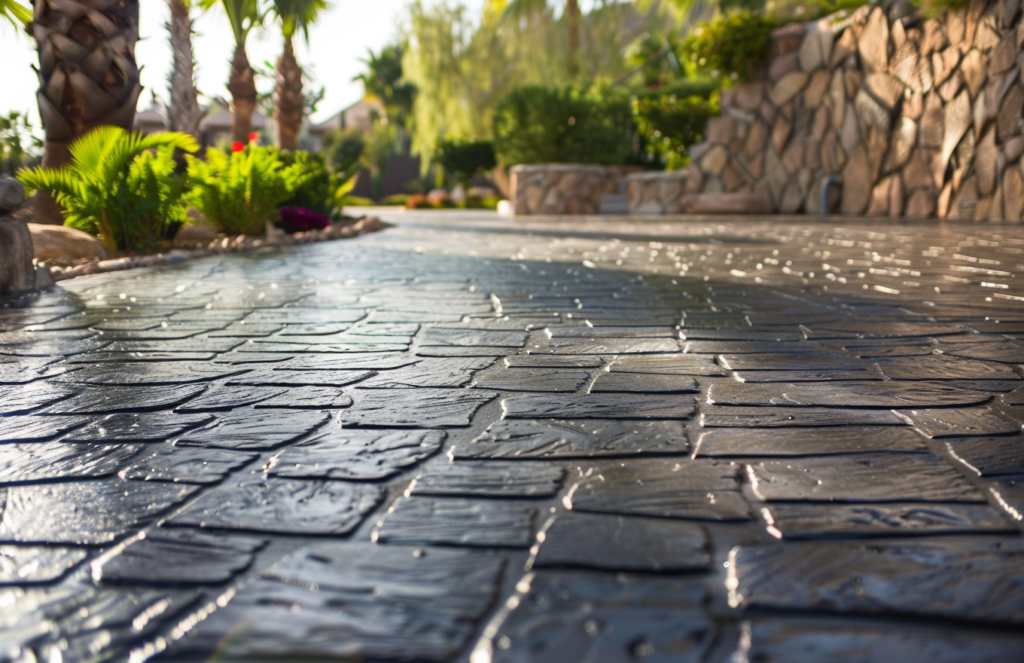Stamped Concrete Sioux Falls
Enhance your property with our expert stamped concrete services. Contact us today!
Transform your outdoor space with our stunning stamped concrete designs.
Stamped concrete is a versatile and cost-effective way to enhance the appearance of your patio, driveway, or walkway. Our skilled team uses high-quality materials and precise techniques to create realistic patterns and textures that mimic the look of natural stone, brick, or wood. With stamped concrete, you can achieve the aesthetic you desire without the high maintenance and expense of traditional materials. Contact us today to learn more about our stamped concrete services and how they can elevate your outdoor living area.
91 123-456-7890

Benefits of Stamped Concrete
Transform Your Space with Stamped Concrete!
Enhance your property with beautiful and durable stamped concrete.
Types of Stamped Concrete Designs
Patterns
Stamped concrete can replicate a variety of patterns that mimic natural materials. Some popular patterns include
- Brick: Imitates traditional brick layouts, such as running bond, basket weave, and herringbone.
- Stone: Mimics natural stones like slate, flagstone, and cobblestone.
- Tile: Creates the look of ceramic or porcelain tiles with various geometric patterns.
- Wood Plank: Replicates the appearance of wooden planks, ideal for a rustic look.
Textures
Textures add depth and realism to stamped concrete. Common textures include
- Smooth: Provides a sleek and polished finish.
- Rough: Emulates the rugged surface of natural stones or weathered wood.
- Seamless Skins: Creates a continuous texture without defined pattern lines, often used for large areas.
Material Quality and Techniques Used

Material Quality
By using high-quality materials and precise techniques, stamped concrete can achieve both aesthetic beauty and long-term durability, making it a popular choice for various applications.
Concrete Mix
High-quality concrete mix is crucial for durability. The mix typically includes cement, sand, aggregate, and water.
Color Hardeners
These are applied to the surface to provide rich and lasting colors. They also enhance the durability of the concrete.
Release Agents
Applied before stamping to prevent the stamps from sticking to the concrete and to add secondary color accents.
Techniques Used
Preparation
The area is excavated, forms are set, and a base is prepared to ensure proper drainage and stability.
Pouring
Concrete is poured and spread evenly across the area.
Stamping
Stamps with desired patterns and textures are pressed into the concrete before it fully sets. Timing is crucial to ensure the concrete is neither too wet nor too dry.
Sealing
Once the concrete has cured, a sealer is applied to protect the surface from stains, moisture, and wear.

Applications of Stamped Concrete
Outdoor Spaces

Patios
Stamped concrete patios are an excellent choice for outdoor living areas. They provide a durable and stylish surface that can replicate the look of natural stone, brick, or wood. The variety of patterns and colors available allows homeowners to customize their patios to match their outdoor décor and personal preferences.

Driveways
Stamped concrete driveways offer a visually appealing and resilient surface that can withstand heavy vehicular traffic. The ability to mimic high-end materials like cobblestone or slate at a lower cost makes stamped concrete a popular choice for driveways. Additionally, the durability of stamped concrete ensures that the driveway will maintain its appearance over time with minimal maintenance.

Walkways
Stamped concrete patios are an excellent choice for outdoor living areas. They provide a durable and stylish surface that can replicate the look of natural stone, brick, or wood. The variety of patterns and colors available allows homeowners to customize their patios to match their outdoor décor and personal preferences.
Commercial vs. Residential Use

Commercial Use
In commercial settings, stamped concrete is often used for sidewalks, entryways, courtyards, and even interior floors. The material’s durability and low maintenance requirements make it ideal for high-traffic areas. Additionally, the wide range of design options allows businesses to create inviting and professional-looking spaces that enhance the overall customer experience. Commercial applications benefit from the ability to replicate expensive materials, providing a luxurious appearance without the associated costs.

Residential Use
For residential applications, stamped concrete is frequently used for patios, driveways, walkways, pool decks, and interior floors. Homeowners appreciate the versatility and aesthetic appeal of stamped concrete, as well as its ability to enhance the curb appeal and value of their property. The customization options available with stamped concrete allow homeowners to create unique outdoor spaces that reflect their personal style. Its low maintenance requirements and durability also make it a practical choice for busy households.
Customization Options for Stamped Concrete
The real beauty of stamped concrete lies in the ability to combine different designs, patterns, and colors to create a truly customized look. This can include using contrasting borders, incorporating multiple patterns within a single area, or using various colors to highlight specific features.

Variety of Designs
Stamped concrete can replicate a wide range of designs, mimicking the look of natural materials such as stone, brick, slate, and wood. This allows for a seamless integration with existing architectural elements and landscaping. Popular design options include
- Flagstone: Creates an elegant and natural appearance, perfect for patios and walkways.
- Brick: Offers a classic look, suitable for driveways and entryways.
- Wood Plank: Provides a rustic feel, ideal for pool decks and patios.
- Cobblestone: Adds a historic charm, often used for driveways and courtyards.

Patterns
The flexibility of stamped concrete allows for intricate patterns that can transform any space. Patterns can range from simple geometric shapes to more complex and artistic designs. Some common patterns include:
- Herringbone: A classic pattern that works well for driveways and walkways.
- Basket Weave: Adds a traditional touch, suitable for patios and pool decks.
- Random Stone: Mimics the irregularity of natural stone, creating a unique look for outdoor spaces.
- European Fan: Offers a sophisticated and decorative pattern, perfect for high-visibility areas.

Colors
Color customization is one of the most appealing aspects of stamped concrete. With the use of color hardeners, integral color, and stains, a vast array of colors can be achieved. This ensures that the stamped concrete can match or complement any surrounding decor. Key color customization methods include
- Integral Color: Mixed into the concrete before pouring, providing consistent color throughout the slab.
- Color Hardeners: Applied to the surface, offering rich and durable colors.
- Acid Stains: Create a variegated and mottled look, adding depth and character.
- Dye Stains: Provide vibrant and translucent colors, ideal for more artistic designs.
Maintenance of Stamped Concrete
Durability and Longevity
Stamped concrete is renowned for its durability and long lifespan. When properly installed and maintained, it can last 25 years or more. Its resistance to weather, heavy traffic, and daily wear and tear makes it an ideal choice for both residential and commercial applications. The key to its longevity lies in its robust structure and the protective sealants used during installation.
Maintenance Tips and Best Practices

Sealing
Initial Sealing: Apply a high-quality sealer after the concrete has cured to protect it from stains, moisture, and UV damage.

Repairs
Crack Repair: Address any cracks as soon as they appear to prevent them from spreading. Use a concrete patching compound that matches the color of your stamped concrete.
Choose from a wide variety of design options, patterns, and colors for your stamped concrete

Enhance Your Space with Beautiful Stamped Concrete
Stamped concrete offers the perfect combination of durability and aesthetic appeal. With its wide range of patterns and colors, you can create a unique and beautiful look for your outdoor spaces. Plus, stamped concrete requires minimal maintenance, making it a cost-effective choice for homeowners and businesses alike.

Concrete Sioux Falls provided exceptional service and exceeded our expectations.

Working with Concrete Sioux Falls was a great experience. They delivered high-quality work on time.
Frequently Asked Questions
Learn more about stamped concrete and find answers to commonly asked questions.
Stamped concrete is a decorative technique where patterns and textures are imprinted on the surface of the concrete to resemble other materials such as brick, stone, or wood.
With proper installation and maintenance, stamped concrete can last for decades. Regular sealing and avoiding harsh chemicals can help prolong its lifespan.
Concrete repair involves fixing cracks, spalling, and other damages in existing concrete structures. It helps restore the structural integrity and appearance of the concrete.
While it is possible for stamped concrete to develop cracks over time, proper installation techniques and regular maintenance can minimize the risk. Control joints are often used to help prevent cracking.
To maintain stamped concrete, it is important to regularly clean it using a mild detergent and water. Applying a sealer every few years can help protect the surface and enhance its appearance.



